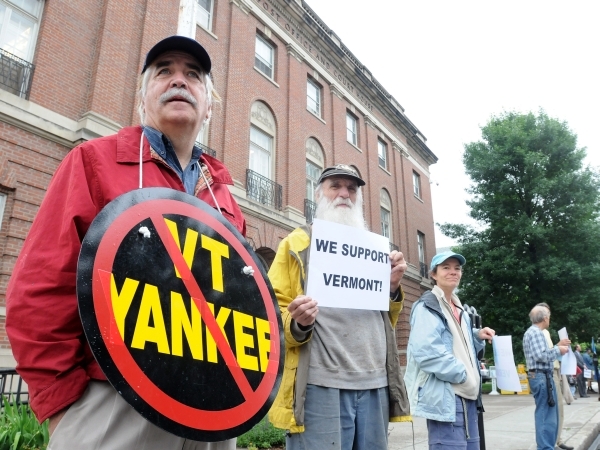
(Host) The state of Vermont and the Entergy Corporation went head to head in a federal courtroom today in a case that could decide whether a state can say "no" to an operating nuclear power plant.
The case concerns Vermont Yankee and whether it can run for another two decades. The opening arguments focused on two points. First, whether the state reached too far in denying the plant permission to operate. And second, whether Entergy breached its promise to Vermont to submit to state oversight.
VPR’s John Dillon was in Brattleboro for the hearing.
(Dillon) A small crowd gathered outside the federal courthouse. Among them was Kevin Dunwoody who drove down from Brookfield to show his support for the state’s position in the case.
(Dunwoody) This seems to be as important about state’s rights as it is about this aging plant. I think it’s important for other states who are going to have other plants being renewed in their own backyards."
(Dillon) Inside the courtroom, Entergy lawyer Kathleen Sullivan argued that the case was not about state’s rights – but about a state overstepping its bounds.
Entergy wants U-S District Judge J. Garvan Murtha to issue an injunction that would allow the plant to keep operating after its current federal license expires next March. The Nuclear Regulatory Commission has issued the plant a 20-year license extension; Vermont wants the plant to close.
Sullivan asked Murtha to invalidate several state laws that regulate Vermont Yankee, including its long-term storage of nuclear waste.
Sullivan delved deep into the record of the Vermont Legislature in an attempt to show that lawmakers were overseeing nuclear safety – which she said is the exclusive domain of the federal government.
"Safety, safety, safety," Sullivan repeated, many times. "As we will see here today, safety is what the state sought to regulate."
Sullivan said that even the state Public Service Board – the three member panel that regulates utilities – was "tainted" by the focus on safety.
But Bridget Asay, an assistant Vermont attorney general, said lawmakers did not stray into the safety arena.
She said federal law does give states the right to regulate other aspects of nuclear power, including reliability, environmental issues and economics.
And Asay said Entergy should not prevail on the federal pre-emption challenge since it had promised several times both in a legal contract and in testimony not to raise the issue. Those promises, Asay said, means Entergy had waived "any pre-emption arguments it may have now or in the future."
(Dillon) Back outside the courthouse, thoughts on just how persuasive each side was depended on people’s opinions on the future of Vermont Yankee.
(Peterson) I’m Duane Peterson, I’m president of the board of directors of VPIRG, the Vermont Public Interest Research Group.
(Dillon) Peterson said the state’s case was compelling.
(Peterson) This is an extraordinary procedure where Entergy Louisiana is asking a federal judge to order the state of Vermont to tolerate a crumbling nuclear power plant that we don’t want. And so far in the proceedings, the judge is very skeptical of granting that rogue corporation enormous powers.
(Dillon) The judge asked probing questions of both sides. And Guy Page, a spokesman for the pro-Yankee Vermont Energy Partnership, said Entergy’s lawyer had scored points with her repeated references in the Statehouse record to lawmakers talking about safety.
(Page) "I think she was very accurate, again from the perspective from anyone who’s been the building for the last two or three years, that safety was a powerful concern.
(Dillon) Vermont Law school professor Pat Parenteau said a threshold question is whether Judge Murtha accepts the state’s argument that it wasn’t trying to regulate safety.
And he said the other big issue is what Murtha thinks of the state’s claim that Entergy breached its promise to follow Vermont law.
(Parenteau) "Entergy has come to court without clean hands they’ve gone back on commitments that they’ve made to the state. They’re now attacking statutes they asked the state to enact for their benefit. These are the kinds of things that a court in equity would say denies you the right to request an equitable remedy."
(Dillon) Entergy wants a decision by the court before it has to buy fuel in mid-July.
For VPR News, I’m John Dillon in Brattleboro.